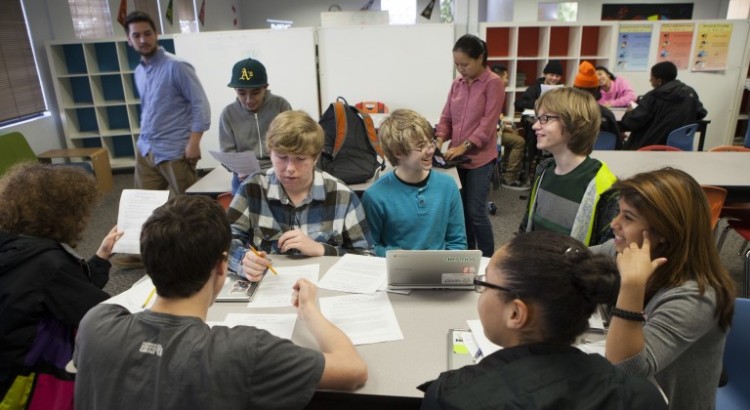TheGuardian/8 de abril de 2016
Resumen: En Gran Bretaña la movilidad social se ve obstaculizada por la cultura de la desigualdad que penaliza el abandono escolar universitario de aquellos que optan por ingresar a la fuerza de trabajo. En este sentido, los Comités sobre la Movilidad Social revisa los contenidos de la enseñanza a partir de los 14 años con el fin de preparar mejor a los adolescentes que no irán a la universidad sino al mundo del trabajo. Por su parte Lady Corston piensa que los jóvenes no están preparados para el mundo del trabajo y perjudica significativamente a un gran número de jóvenes, limitando sus oportunidades de movilidad social. Los jóvenes estaban en peligro de quedar atrapado en trabajos de baja cualificación y con salarios bajos, con pocas posibilidades de una carrera gratificante, dijo. Sin embargo, las opiniones expresas en el informe emitido por la Comisión, pasa por alto que «una cultura de la desigualdad entre las rutas profesionales y académicos para trabajar» impregna el sistema educativo. Con lo cual, la conclusión: «La expansión de la educación superior ha servido bien a algunos grupos”, tiene desventaja para las personas que ya no están siendo atendidos por el sistema de educación e inhibe la movilidad social ascendente para los que están en el medio. Por ende, las rutas no académicos para el empleo son complejos, confusos e incoherentes. El sistema de calificaciones se confunde de manera similar y ha sido sometida a cambios continuos”. Por ello, los últimos cuatro años de estudio deben ser rediseñados para que más alumnos puedan pasar reconocida cualificación profesional a la par con los A-levels. No obstante, el informe también destaca el bajo nivel de financiación de 16 a 19 años de edad que ha tenido un impacto importante en la capacidad de las escuelas y universidades para proporcionar la amplitud y la elección curricular que necesitan los jóvenes. Se necesita urgentemente una mayor inversión.
The final four years of schooling should be redesigned so that more pupils can pass recognised vocational qualifications on a par with A-level, says the report. Photograph: Niall Carson/PA
Social mobility in Britain is hampered by a “culture of inequality” that penalises school leavers who enter the workforce rather than higher education, according to a parliamentary report.
An investigation by the House of Lords committee on social mobility called for radical revisions to the content of schooling from the age of 14, to better prepare teenagers who do not go on to university for the world of work.
“The current system for helping people move from school to work is failing most young people,” said Lady Corston, who chaired the committee. “They are simply not being adequately prepared for the world of work. This significantly disadvantages a huge number of young people and limits their opportunity for social mobility.”
Related:Apprenticeships drive has diluted quality, says Ofsted chief
Young people were in danger of being trapped in low-skilled, low-paid work, with little chance of a rewarding career, she said. “A young person considering their options for further education or employment is presented with gobbledygook. It is totally unclear to them how they can get the skills needed for a successful career.”
The report, Overlooked and Left Behind, argues that “a culture of inequality between vocational and academic routes to work” pervades the education system.
It concludes: “The expansion of higher education has served some groups well. It has, however, disadvantaged those already underserved by the education system and inhibited upwards social mobility for those in the middle.
“Non-academic routes to employment are complex, confusing and incoherent. The qualifications system is similarly confused and has been subjected to continual change.”
Instead, the final four years of schooling should be redesigned so that more pupils can pass recognised vocational qualifications on a par with A-levels.
Malcolm Trobe, interim general secretary of the Association of School and College Leaders, applauded the report’s call for a new curriculum that placed greater emphasis on skills and vocational qualifications.
“We agree. The intense academic focus of the existing curriculum is too narrow for some students and a new approach is needed,” he said.
“The report also highlights the low level of funding for 16 to 19-year-olds which has had a major impact on the ability of schools and colleges to provide the curriculum breadth and choice needed by young people. Greater investment is urgently needed.”
A Department for Education spokesperson said it would respond to the report’s recommendations in due course, but noted: “The latest figures show the number of young people not in education or training is at the lowest on record.
“We have the highest ever number of young people going into higher education. We have introduced a more rigorous curriculum so every child learns the basic skills they need, such as English and maths, so they can go on to fulfil their potential whether they are going into the world of work or continuing their studies.”
The peers’ report calls for a cabinet-level minister to be given responsibility for the transition from school to work for young people, to avoid the current state where responsibility falls between the DfE, the Department for Business, Innovation and Skills or the Department for Work and Pensions.
The report also wants a new “gold standard” in independent careers advice and guidance for state school pupils, with the government consulting local employers on the skills needed in regional labour markets.
The DfE also said it was planning to invest £70m in its careers programme over the next parliament, and had set up structures to develop closer links between young people and employers.
Fuente: http://www.theguardian.com/politics/2016/apr/08/social-mobility-hindered-culture-of-inequality-school-system-university-work
Imagen: https://www.google.com/search?q=%E2%80%98culture+of+inequality%E2%80%99+in+school+system&source=lnms&tbm=isch&sa=X&ved=0ahUKEwjE6M6y2IDMAhWBbz4KHRNQA_8Q_AUICCgC&biw=1366&bih=623#imgrc=LuwESWlLz9iNNM%3A





 Users Today : 38
Users Today : 38 Total Users : 35459944
Total Users : 35459944 Views Today : 44
Views Today : 44 Total views : 3418509
Total views : 3418509